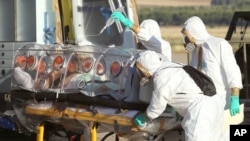As the death toll from the Ebola virus disease continues to soar in several West African countries, an experimental drug called ZMapp was administered to two U.S. missionaries who contracted the virus while working with Ebola patients in Liberia.
The two patients are reportedly doing well in an Atlanta hospital, but a Spanish priest tested positive for the virus in Monrovia may have received the same drug before dying in a Madrid hospital.
The drug was developed by a U.S. pharmaceutical firm but has not been tested for safety or effectiveness on humans. Dr. Philip M. Rosoff says this is the problem with experimental drugs that have never been clinically tested in humans. One does not know whether or not they will work -- and on whom do they work.
Rosoff is professor of pediatrics and medicine,the director of clinical ethics at Duke University Hospital in Durham, North Carolina and author of the recently released book, “Rationing Is Not a Four-Letter Word: Setting Limits on Healthcare.”
He spoke on the ramifications of using an untested drug to treat humans.
The risk of unanticipated toxicities
Among the many risks of using an untested drug to treat humans, Rosoff says “there are the risks of unanticipated toxicities.” But because there is no known cure the disease, the World Health Organization has permitted the use of untested treatments. The question is then, who will get the limited supplies?
He says that in desperate situations such as West Africa where only 10 percent of those who contract Ebola survive, doctors must approach it with a great deal of caution, care and thoughtfulness.
“Desperate people are willing to take desperate measures to save their lives or the lives of their loved ones,” said Rosoff. “And those who would hold out hope to those desperate people need to take great care that the hope is not portrayed in an inappropriate or unrealistic manner.”
He emphasizes it would be impossible to know if this drug is effective upfront since no experiments as far as he knows have been done to show that it is effective in people, or not effective for that matter.
In determining who should receive the drug, the same manner of care and thought should go into the decision.
How to ration life-saving treatments
“This is a classic rationing problem, and you have to decide to whom to administer. These kinds of decisions should not be made behind closed doors, but should be expeditiously managed and discussed openly about how the rationing choice will be made,” Rosoff said.
For example, he points out, you may decide to treat healthcare workers first because they are the front-line defense for Ebola. The first contact with the patient and sick people cannot be cared for if there are no health workers to take care of them.
“Other considerations are - should you give it to the sickest people first, or should you give it to those who might be thought medically to have the best opportunity to survive,” Roseff said.
Once you have identified a class of people who are the first to be eligible for the drug - such as first-line health workers - there are many ways to decide how others in need should get the drug.
“Some people think that a lottery or coin toss mechanism is the fairest. Other people think first-in-line – first-come, first-served – might be the fairest. The problem with first-come, first-served is that tends to privilege people who can get there first, and that’s sometimes people who have access to information or transportation,” Rosoff said.
Consideration must be done carefully and transparently so everyone knows what the rules are.











